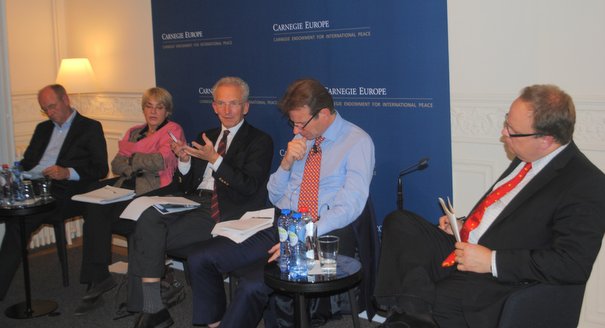Registration
You will receive an email confirming your registration.
IMGXYZ3919IMGZYXWhile the European Union’s foreign and security policy is based on the equality of its member states, France, Germany, and the United Kingdom have traditionally played a leading role. As the EU struggles with the ongoing euro crisis, the attitude of these “big three” will crucially influence the future scope and direction of its role in international relations.
To mark the launch of his new paper, “The Big Three in EU Foreign Policy,” Carnegie’s Stefan Lehne discussed the future of the EU’s standing as an international actor and the strength of its internal integration. He was joined by Charles Grant, director of the Centre for European Reform, Josef Janning, director of studies at the European Policy Centre, and Anne-Marie Le Gloannec, senior research fellow at Sciences Po in Paris. Carnegie’s Jan Techau moderated.
Highlights
- Dominance in EU Foreign Policy: Lehne noted that the big three–Germany, France, United Kingdom–are uniquely powerful players in EU foreign policy due to their economic strengths and diplomatic capacities. After the Lisbon Treaty, the relatively weak EU institutions failed to create an even playing field for member states, and the biggest three gained an advantage. As a result, a consensus among the big three on any given policy carries priority at the EU level.
- Germany: Germany advocates for a much more integrated EU than France or the United Kingdom, Lehne argued. Yet, despite a clear vision and ample capacity, Germany doesn’t display the political will to lead the EU's foreign policy agenda, which Lehne attributed to their “comfortable” present economic and national security situation. Le Gloannec added that Germany’s reluctance to lead is likely due to a lack of geostrategic vision.
- France: In contrast to Germany, France’s drive to lead could be the impetus for a more ambitious EU foreign policy, depending on priorities of the Hollande administration. Grant looked to the new administration with optimism. Le Gloannec, however, drew a more pessimistic picture, suggesting that Hollande’s administration is less EU oriented than Sarkozy’s, which will likely result in a more nationalized French foreign policy. Traditionally, France wants a strong Europe with weak institutions, she added.
- United Kingdom: Lehne stated that the United Kingdom employs the best of the European foreign services, which, in an increasingly globalized world, struggles to stay relevant. Grant added that it suffers from financial constraints and offers fewer opportunities for talented young diplomats in their overseas representations.
- The Euro Crisis and EU Foreign Policy: The euro crisis will decide the fate of the EU’s foreign policy, Lehne stated; if it cannot be resolved, EU foreign policy will be “collateral damage.” If the euro crisis is resolved, the level of integration towards a federalist model is a key factor in the survival of EU foreign policy, which relies on strong institutions. Grant highlighted several areas of potential cooperation in EU foreign policy, concluding that, despite the Euro crisis, “the machine has not broken down yet”. Panelists agreed that the crisis may even serve as a uniting factor for EU member states.
- A Common Foreign Policy? Panelists agreed that weak and ineffective institutions inhibit the development of a unified EU foreign policy and that, historically, the political will to create a common foreign policy vision has weakened since the onset of the European project. Janning advocated that the Common Security and Defence Policy could drive a common EU foreign policy.
